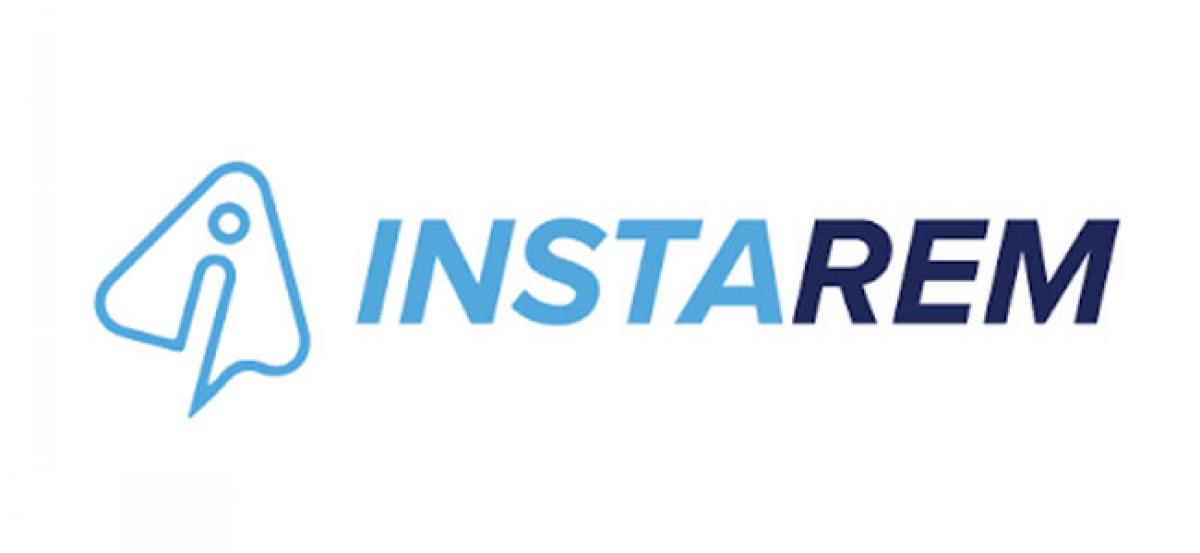Live
- AI Model Detects Residual Brain Tumors in 10 Seconds, Offers Real-Time Surgical Guidance
- Reliance and Disney Complete JV Deal to Strengthen Entertainment Presence in India
- UP Govt Agrees to Protesters’ Demand, PCS Exam to Be Held in One Day
- Trump’s Social Security Tax Promise Faces Hurdles: What Retirees Need to Know
- Strict Action Needed Against Attacks on Government Employees - Retired Employees
- Hyundai Motor India Limited Announces 2024 Edition of ‘Hyundai Always Around’ Campaign
- Minister for Environment, Forests, and Endowments Celebrates Karthika Pournami and Guru Nanak Jayanti
- World Quality Day: Hindustan Zinc Reaffirms Commitment to Superior Product Quality & Innovation
- Grand Kartika Purnima Celebrations at Nagar Kurnool’s Saraswati Shishu Mandir
- Children’s day celebrations, Karnataka remnisences on Nehru’s contributions
Just In
InstaReM gets RBI approval to offer outbound remittance services from India


InstaReM, the Singapore-headquartered FinTech start-up offering convenient, fast and cost-effective cross-border money transfers to individuals and businesses, has received regulatory approval from the Reserve Bank of India (RBI) for facilitating overseas remittances from India.
The FinTech start-up will start its money transfer services in partnership with an AD-I bank by November 2017
Mumbai: InstaReM, the Singapore-headquartered FinTech start-up offering convenient, fast and cost-effective cross-border money transfers to individuals and businesses, has received regulatory approval from the Reserve Bank of India (RBI) for facilitating overseas remittances from India.
InstaReM plans to start its outbound money transfer services from India by November 2017 in partnership with a leading AD-I (Authorized Dealer - Category I) bank, per RBI’s governing conditions for the partnership. With RBI’s approval in place, InstaReM will be able to effect outbound remittances from India for transactions pertaining to business / private visits, overseas education, medical treatment etc.Announcing the receipt of RBI approval, Prajit Nanu, CEO and co-founder, InstaReM said,
“An increasing number of Indians are now getting engaged with overseas counterparts for business, leisure, medical, education, entertainment-related activities, which involve transfer of money to foreign countries. Traditional ways of transferring money overseas are expensive due to high transfer charges along with hidden fees which are not known to the customers. With its automated platform and deep relationships with banks, InstaReM is able to offer transparent international money transfers – at a fraction of costs compared to the traditional players. With InstaReM’s superior platform and exceptional customer service, we are confident of capturing a substantial market for outbound money transfer from India.”
Traditional international money transfers from India are expensive and opaque. Depending on the amount transferred and destination country, banks and money transfer operators charge INR 750-1,500 in transfer fees, apart from the hidden FX spreads of up to 3% which are not known to the sender. For instance, to send INR 100,000 to the U.S., the sender ends up spending around INR 3,500-4,500 (INR 500-1,500 in transaction fees, plus up to INR 3,000 in FX charges) in traditional transfers. In contrast, InstaReM’s transparent fee of approx. 0.5% costs the sender just INR 500 for the same transaction. Recognizing its cost-effective service, the World Bank has consistently ranked InstaReM as the most competitive remittance platform in a number of Asian corridors including, Australia to India, Malaysia, Philippines and Vietnam as well as from Singapore to Bangladesh, India, Indonesia, Malaysia, Philippines, and Sri Lanka.
Another differentiator is that InstaReM is able to transfer funds within 24-36 hours in Asia, compared to the average two to four days transfer by banks.
Apart from the faster, hassle-free, and cost-effective cross-border remittances to individuals, the company also enables corporations and SMEs to make bulk payments using its institutional platform MassPay, which is a configurable solution for corporate / SME users to manage and control their high-volume remittances to multiple beneficiaries in multiple currencies via a seamless process.
InstaReM holds licenses to conduct money transfer business in Singapore, Hong Kong, U.S., Europe, Australia and Canada. The company has offices in Singapore, Australia, Hong Kong, a 100-people operations office in Mumbai and a technology center in Lithuania, and is well on its way to expanding into all markets in Europe and the U.S. by Q4 2017.
Since starting operations in August 2015, InstaReM has raised US$ 18 million in two rounds of funding. Its investors include Global Founders Capital, Vertex Ventures (VC arm of Temasek Holdings), Fullerton Financial Holdings, GSR Ventures and SBI-FMO Emerging Asia Financial Sector Fund.

© 2024 Hyderabad Media House Limited/The Hans India. All rights reserved. Powered by hocalwire.com






